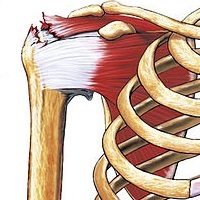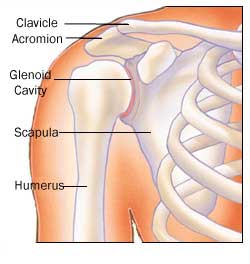Rotator cuff tear
(Redirected from Rotator cuff disease)
Injury to the shoulder's rotator cuff muscles or tendons
| Rotator cuff tear | |
|---|---|
| [[File:|250px|alt=|]] | |
| Synonyms | N/A |
| Pronounce | N/A |
| Field | Orthopedics |
| Symptoms | Shoulder pain, weakness, limited range of motion |
| Complications | Frozen shoulder, arthritis |
| Onset | |
| Duration | |
| Types | Partial tear, full-thickness tear |
| Causes | Acute injury, chronic overuse |
| Risks | Age, repetitive overhead activities, trauma |
| Diagnosis | Physical examination, imaging studies |
| Differential diagnosis | Shoulder impingement, bursitis, tendinitis |
| Prevention | Strengthening exercises, proper technique |
| Treatment | Physical therapy, medications, surgery |
| Medication | N/A |
| Prognosis | |
| Frequency | |
| Deaths | N/A |
A rotator cuff tear is a common injury involving the shoulder's rotator cuff muscles or tendons. The rotator cuff is a group of four muscles and their associated tendons that stabilize the shoulder and allow for its wide range of motion.
Anatomy[edit | edit source]
The rotator cuff consists of the supraspinatus, infraspinatus, teres minor, and subscapularis muscles. These muscles originate from the scapula and attach to the humerus, forming a cuff around the shoulder joint.
Types[edit | edit source]
Rotator cuff tears can be classified into two main types:
- Partial tear: This type of tear damages the soft tissue but does not completely sever it.
- Full-thickness tear: This type of tear is more severe and involves a complete rupture of the tendon.
Causes[edit | edit source]
Rotator cuff tears can result from:
- Acute injury: Sudden trauma, such as falling on an outstretched arm.
- Chronic overuse: Repetitive overhead activities, common in sports like baseball and tennis, or occupations such as painting and carpentry.
Risk Factors[edit | edit source]
Several factors can increase the risk of developing a rotator cuff tear:
- Age: The risk increases with age due to wear and tear.
- Repetitive overhead activities: Sports and jobs that involve frequent overhead motions.
- Trauma: Direct injury to the shoulder.
Symptoms[edit | edit source]
Common symptoms of a rotator cuff tear include:
- Shoulder pain, especially at night
- Weakness in the shoulder
- Limited range of motion
Diagnosis[edit | edit source]
Diagnosis typically involves:
- Physical examination: Assessing pain, range of motion, and strength.
- Imaging studies: X-rays, ultrasound, or MRI to visualize the tear.
Differential Diagnosis[edit | edit source]
Conditions that may present similarly include:
Treatment[edit | edit source]
Treatment options vary based on the severity of the tear:
- Non-surgical: Physical therapy, medications such as NSAIDs, and corticosteroid injections.
- Surgical: Arthroscopic surgery or open repair for severe cases.
Prevention[edit | edit source]
Preventive measures include:
- Strengthening exercises: Focused on the rotator cuff and shoulder muscles.
- Proper technique: In sports and occupational activities to avoid overuse injuries.
Complications[edit | edit source]
Potential complications from a rotator cuff tear include:
- Frozen shoulder (adhesive capsulitis)
- Arthritis in the shoulder joint
See Also[edit | edit source]
References[edit | edit source]
Search WikiMD
Ad.Tired of being Overweight? Try W8MD's physician weight loss program.
Semaglutide (Ozempic / Wegovy and Tirzepatide (Mounjaro / Zepbound) available.
Advertise on WikiMD
|
WikiMD's Wellness Encyclopedia |
| Let Food Be Thy Medicine Medicine Thy Food - Hippocrates |
Translate this page: - East Asian
中文,
日本,
한국어,
South Asian
हिन्दी,
தமிழ்,
తెలుగు,
Urdu,
ಕನ್ನಡ,
Southeast Asian
Indonesian,
Vietnamese,
Thai,
မြန်မာဘာသာ,
বাংলা
European
español,
Deutsch,
français,
Greek,
português do Brasil,
polski,
română,
русский,
Nederlands,
norsk,
svenska,
suomi,
Italian
Middle Eastern & African
عربى,
Turkish,
Persian,
Hebrew,
Afrikaans,
isiZulu,
Kiswahili,
Other
Bulgarian,
Hungarian,
Czech,
Swedish,
മലയാളം,
मराठी,
ਪੰਜਾਬੀ,
ગુજરાતી,
Portuguese,
Ukrainian
Medical Disclaimer: WikiMD is not a substitute for professional medical advice. The information on WikiMD is provided as an information resource only, may be incorrect, outdated or misleading, and is not to be used or relied on for any diagnostic or treatment purposes. Please consult your health care provider before making any healthcare decisions or for guidance about a specific medical condition. WikiMD expressly disclaims responsibility, and shall have no liability, for any damages, loss, injury, or liability whatsoever suffered as a result of your reliance on the information contained in this site. By visiting this site you agree to the foregoing terms and conditions, which may from time to time be changed or supplemented by WikiMD. If you do not agree to the foregoing terms and conditions, you should not enter or use this site. See full disclaimer.
Credits:Most images are courtesy of Wikimedia commons, and templates, categories Wikipedia, licensed under CC BY SA or similar.
Contributors: Prab R. Tumpati, MD





